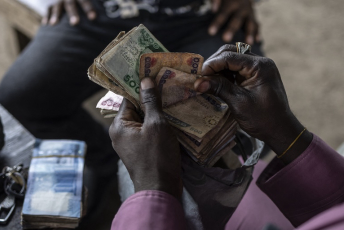Extortion in South Africa is not new. However, the past decade has seen a rapid rise in such practices affecting a wider range of sectors in the economy.
Extortion occurs when people are forced through violence, or the threat of violence, to do something, like give money or property or provide a service, against their will.
Research conducted by the Global Initiative against Transnational Organised Crime (GI-TOC) shows that four distinct extortion economies have emerged in Cape Town.
In the central business district, two different criminal enterprises, one allegedly linked to Mark Lifman and the other allegedly linked to Nafiz Modack, are connected to gangs operating on the Cape Flats. They demand that restaurants, bars and night clubs pay protection fees and hire private security and bouncers linked to these criminal enterprises.
In the construction extortion economy, gangs or armed men masquerading as local business forums invade construction sites, demanding a stake in the project. The transport extortion economy involves elements in the minibus taxi industry demanding money from other minibus taxi operators, bus companies and even private vehicles. Last, the township enterprise extortion economy involves gangs forcing both formal and informal businesses, including informal traders, to pay them protection fees.
While these different economies are relatively distinct, they are also linked, with various actors criss-crossing between them. Many involved in these economies are also connected to other criminal activities, including the illicit firearms trade, drug trafficking and armed robberies.
The growth and entrenchment of organised gangs in different parts of the country have contributed significantly to the rise in extortion. In the Western Cape, older established gangs have always been involved in this crime. Over the years, however, they have honed their skills and practices and found new ways to grow their businesses, allowing these activities to become more central to their operations.
Extortion is also a learnt practice. As new gangs emerge in different parts of the country, they learn from the other gangs and criminal enterprises involved in it, adapting methods and models to suit their circumstances. For many of these emerging gangs, extortion is not just a side business but a core function of their operations. In places like Khayelitsha in the Western Cape, many gangs derive the bulk of their income from it.
As with many international rackets, extortion in South Africa has been fuelled by initial successes, which led to expansion and copycatting. Such practices in the township enterprise economies of Khayelitsha and Alexandra (Gauteng) provide a clear example of this. Gangs and criminal enterprises initially targeted foreign-owned businesses and then, emboldened by their successes, expanded these practices to other locally owned businesses.
Similarly, in the transport sector, extortion has spread from the taxi industry and is now directed at other forms of transport, including bus and ride-hailing services. In the construction sector, criminals learnt from the construction mafia’s activities in KwaZulu-Natal and began copying and adapting these extortion techniques, spreading the practice to almost all parts of the country.
Compared with some other forms of crime, such as armed robberies, extortion could be considered relatively low risk. At a Business Against Crime conference in February 2024, the Western Cape’s Deputy Director of Public Prosecutions, Advocate Mervyn Menigo, said: ‘Extortion is low risk, high reward. You threaten somebody and get money. Kill one person and you got the whole community in your pocket.’
In some places in the Western Cape and in townships like Alexandra in Gauteng, criminals involved in cash-in-transit heists and hijackings have turned their sights on extortion. ‘They come with the same tactics they would with cash-in-transit heists, only the victim is unarmed, and they can’t shoot back at you,’ says Menigo.
Internationally, these practices flourish and expand in environments where state presence is weak or absent, or where the state does not have the community’s confidence. This is so in South Africa, where businesses and residents in certain areas may see protection payments as necessary or as something they cannot challenge. People in these areas often comply with extortion demands because they believe the state cannot protect them, or that groups involved in it can provide better protection.
The capacity and willingness to use violence is an essential part of extortion in South Africa. The victim needs to believe that failure to comply will result in harm. Therefore, most extortion economies in the country involve different cycles of violence associated with different stages of the practice.
When extortion economies are first being established, the levels and threats of violence are usually high to ensure compliance with the demands. Then, once the group has consolidated its authority and the practice has taken root, violence levels may decline, although the threat remains. If extortionists seek to expand their territory or their authority is threatened by rival groups, the levels of violence will escalate.
The high levels of violence associated with extortion economies, coupled with the perception that the state cannot protect victims from this violence, has led to the entrenchment and normalisation of many of these economies.
International research indicates that once these economies become entrenched and normalised, they are harder to address. This entrenchment and normalisation, coupled with its rapid expansion and the links between criminal actors involved in the different economies, is what makes extortion in South Africa so dangerous.
To address this growing trend, it is crucial to understand how the various extortion economies connect and intersect. We need to develop a more evidence-based approach to the problem that traces the links between extortion economies and enables the disruption and destabilisation of the strength and capacity of those involved.
A more coordinated approach and strategy to address the issue needs to involve all tiers of government, with different departments working together. The approach also needs to draw in businesses and communities that are most affected.
Jenni Irish-Qhobosheane, Senior Expert, South African Observatory Global Initiative Against Transnational Organised Crime (GI-TOC)
Image: iStock / Getty Images Plus








